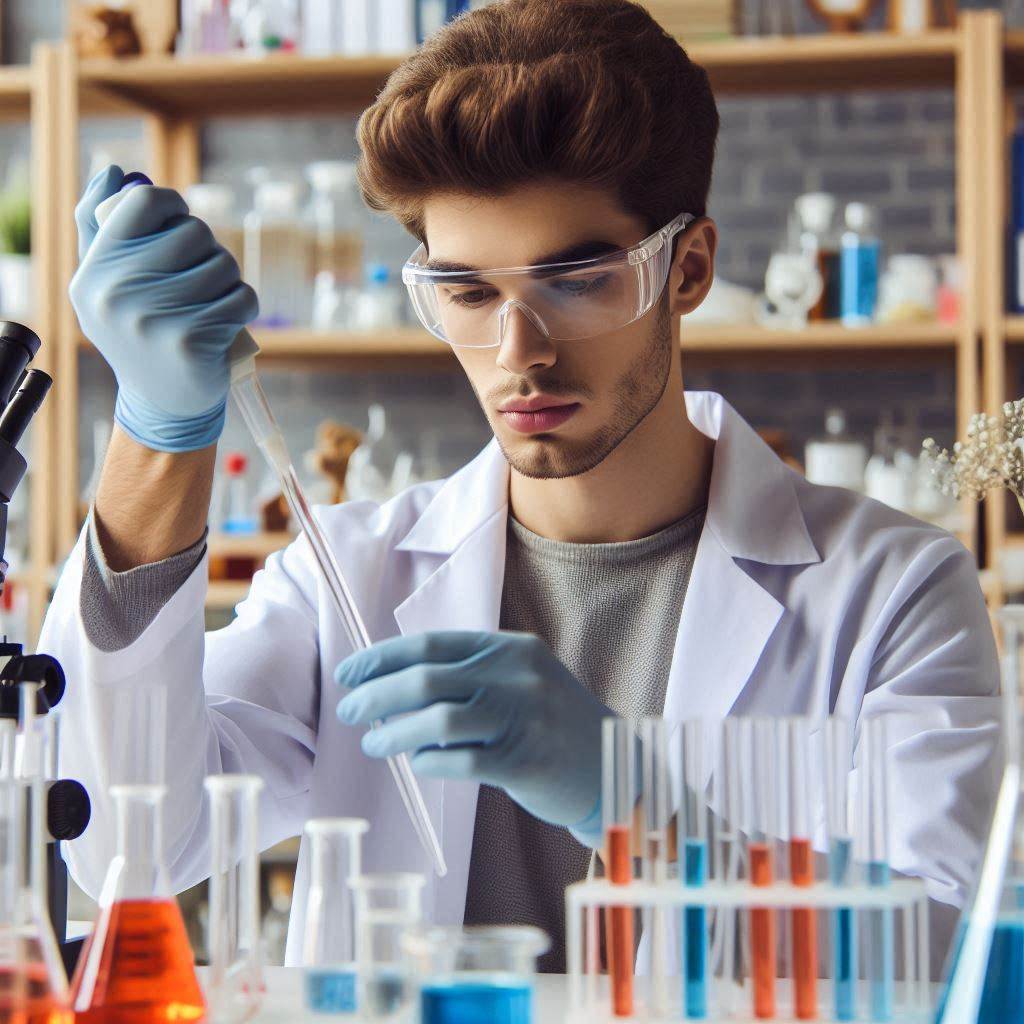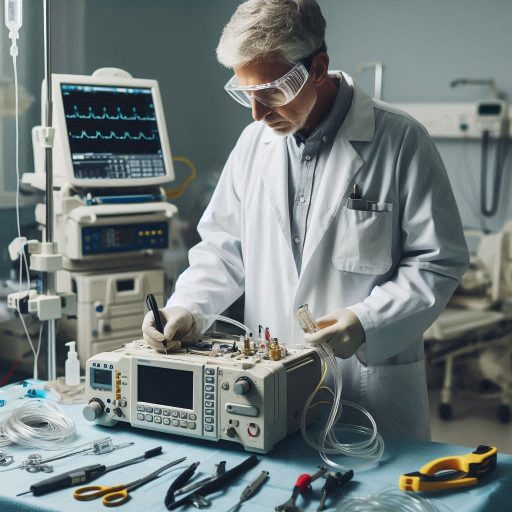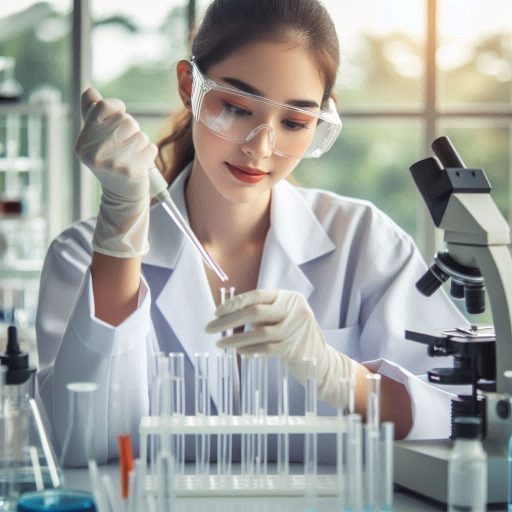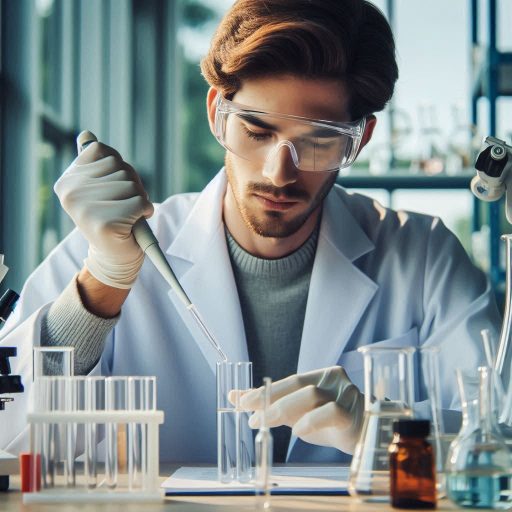Introduction
Laboratory technicians play a vital role in healthcare by conducting tests and analyzing samples.
They ensure accurate test results that help diagnose and treat patients.
Their work supports doctors, nurses, and other healthcare professionals in making informed decisions.
However, laboratory technicians face several challenges that impact their daily work and job satisfaction.
Brief Overview of the Role of Laboratory Technicians
Laboratory technicians operate complex equipment to conduct tests on blood, urine, and other samples.
They prepare and process specimens, ensuring that test results are accurate and reliable.
Their responsibilities include maintaining laboratory instruments, recording data, and following strict protocols.
Technicians must have a strong understanding of scientific principles and technical skills to perform their tasks efficiently.
Importance of Laboratory Technicians in the Healthcare Industry
Laboratory technicians are crucial for diagnosing diseases and monitoring patient health.
Their accurate test results guide treatment plans and influence patient outcomes.
They also play a key role in preventive care by identifying potential health issues early.
The work of laboratory technicians underpins the entire healthcare system, making their role indispensable in providing quality patient care.
Preview of Common Challenges Faced by Laboratory Technicians
Laboratory technicians encounter various challenges that affect their work environment and efficiency.
These challenges include handling complex and often outdated equipment, managing high workloads, and dealing with potential contamination risks.
Additionally, they face the pressure of maintaining accuracy while working under tight deadlines.
Understanding these challenges is crucial for improving their working conditions and ensuring the quality of their work.
Complex and Outdated Equipment
One significant challenge is working with complex and often outdated equipment.
Technicians must be adept at operating various machines and troubleshooting issues that arise.
Outdated equipment can lead to inaccuracies and delays in test results.
Regular maintenance and updates are essential, but budget constraints often hinder these improvements.
Managing High Workloads
Laboratory technicians frequently manage high workloads, especially in busy healthcare settings.
They must process numerous samples quickly while maintaining accuracy.
This high demand can lead to stress and fatigue, impacting their performance and job satisfaction.
Proper staffing and efficient workflow management are crucial to addressing this challenge.
Dealing with Contamination Risks
Contamination is a constant concern in laboratory settings.
Technicians must adhere to strict protocols to prevent sample contamination and ensure accurate results.
They must be vigilant about hygiene practices and the proper handling of specimens.
Despite their best efforts, the risk of contamination can never be entirely eliminated, adding to the complexity of their job.
Maintaining Accuracy Under Pressure
Laboratory technicians often work under tight deadlines, which can pressure them to produce results quickly.
This pressure can compromise the accuracy of test results if not managed properly.
Technicians must balance speed with precision, a challenging task that requires focus and attention to detail.
In summary, while laboratory technicians play a critical role in healthcare, they face several challenges.
Addressing issues such as outdated equipment, high workloads, contamination risks, and pressure to maintain accuracy is essential for improving their work environment and job satisfaction.
Lack of Proper Training and Education
Laboratory technicians face many challenges in their daily work.
One of the most pressing issues is the lack of proper training and education.
This challenge can significantly impact their job performance and the overall quality of laboratory results.
Proper training ensures that technicians have the knowledge and skills needed to perform complex tasks accurately and safely.
Importance of Proper Training for Laboratory Technicians
Proper training is crucial for laboratory technicians.
It equips them with the necessary skills to handle advanced equipment and follow strict protocols.
Without adequate training, technicians might struggle with operating sophisticated instruments, interpreting test results, or adhering to safety procedures.
Well-trained technicians can perform their duties efficiently, reducing the risk of errors and improving patient outcomes.
Furthermore, comprehensive training helps technicians stay updated with the latest advancements in laboratory technology and techniques.
Effects of Inadequate Education on Job Performance
Inadequate education can severely affect a laboratory technician‘s job performance.
Technicians who lack proper education may not fully understand the principles behind various tests and procedures.
This knowledge gap can lead to incorrect test results, misinterpretation of data, and poor decision-making.
Additionally, a lack of education can result in inefficiencies, increased error rates, and potential safety hazards.
Technicians might also find it challenging to adapt to new technologies or changes in laboratory practices if their foundational knowledge is insufficient.
Ways to Address This Challenge Through Continuous Education and Training Programs
Addressing the challenge of inadequate training involves implementing continuous education and training programs.
These programs help technicians stay current with evolving technologies and industry standards.
Regular workshops, online courses, and professional certifications can enhance technicians‘ skills and knowledge.
Employers should encourage ongoing learning and provide opportunities for technicians to attend relevant training sessions.
Creating a culture of continuous improvement ensures that technicians are well-prepared to tackle the complexities of their roles and maintain high standards of accuracy and safety in the laboratory.
In summary, proper training and education are vital for laboratory technicians.
It impacts their ability to perform tasks accurately and safely.
By addressing the issue through continuous education and training programs, laboratories can ensure their technicians are well-equipped to handle their responsibilities effectively.
Time Management
Balancing Multiple Tasks and Deadlines in a Fast-Paced Environment
Laboratory technicians often juggle various tasks under tight deadlines.
In a lab, it‘s not uncommon to face multiple simultaneous projects.
Each project requires different procedures, equipment, and documentation.
Keeping track of these demands can be overwhelming.
For example, while processing samples, technicians must also record data, maintain equipment, and adhere to safety protocols.
The fast-paced environment requires swift yet accurate execution of tasks.
Distractions or interruptions can significantly impact efficiency and quality.
Thus, effective multitasking becomes crucial in maintaining laboratory productivity and meeting deadlines.
Strategies for Improving Time Management Skills
Improving time management skills is essential for laboratory technicians.
One effective strategy is creating detailed daily schedules.
Breaking down tasks into manageable segments helps in tracking progress.
Using tools like calendars and task management apps can aid in staying organized.
Prioritizing tasks based on urgency and importance allows for focused work.
Implementing time-blocking techniques, where specific times are allocated for particular tasks, enhances productivity.
Regularly reviewing and adjusting schedules based on workload changes also ensures better time management.
Adopting these strategies helps technicians handle their workload more efficiently.
Importance of Setting Priorities and Effective Planning
Setting priorities and effective planning are fundamental to managing a technician’s workload.
Prioritizing tasks helps in focusing on what needs immediate attention.
Identifying critical tasks and completing them first prevents bottlenecks and delays.
Effective planning involves creating a roadmap for daily, weekly, and monthly tasks.
This planning should include setting realistic deadlines and allocating resources accordingly.
Regularly reassessing priorities ensures that critical tasks are not overlooked.
Proper planning also involves anticipating potential challenges and preparing solutions in advance.
By setting priorities and planning effectively, technicians can manage their tasks more efficiently and reduce stress.
Laboratory technicians face significant challenges in managing their time due to the fast-paced nature of their work.
Balancing multiple tasks and deadlines demands efficient strategies and effective planning.
By mastering time management techniques, technicians can enhance their productivity and job satisfaction.
Read: Recent Trends in Surveying and Mapping Technologies
Workplace Stress
Working as a laboratory technician can be a rewarding career, but it also comes with its fair share of challenges.
One of the most common challenges that lab technicians face is workplace stress. Here are some factors that contribute to stress in a laboratory setting:
- High Pressure Environment: Lab technicians often work under tight deadlines and strict quality control measures, leading to increased stress levels.
- Heavy Workload: The nature of laboratory work requires technicians to handle multiple tasks simultaneously, leading to feelings of overwhelm and stress.
- Shift Work: Many laboratories operate 24/7, requiring technicians to work irregular hours and night shifts, disrupting their natural sleep patterns and causing additional stress.
- Strict Regulations: Laboratories must adhere to strict regulations and safety protocols, which can create additional pressure for technicians to perform flawlessly.
Impact of Stress on Job Satisfaction and Performance
It is essential to address workplace stress as it can have a significant impact on job satisfaction and performance.
When lab technicians are stressed, they are more likely to experience:
Transform Your Career Today
Unlock a personalized career strategy that drives real results. Get tailored advice and a roadmap designed just for you.
Start Now- Decreased productivity: Stress can impair cognitive functions and decision-making abilities, leading to a decrease in overall productivity.
- Lower job satisfaction: High levels of stress can negatively impact job satisfaction, causing technicians to feel demotivated and dissatisfied with their work.
- Increased errors: Stress can lead to lapses in concentration and attention to detail, increasing the likelihood of making mistakes in the laboratory.
- Burnout: Prolonged exposure to stress can result in burnout, causing physical and emotional exhaustion, and a loss of interest in work.
Techniques for Managing Stress
Fortunately, there are several techniques that laboratory technicians can use to manage and reduce workplace stress. Some effective strategies include:
- Mindfulness: Practicing mindfulness meditation and breathing exercises can help technicians stay present and focused, reducing stress levels.
- Self-Care Practices: Engaging in self-care activities such as exercise, healthy eating, and hobbies can help technicians relax and recharge outside of work.
- Time Management: Prioritizing tasks, setting realistic goals, and organizing workflow can help technicians better manage their workload and minimize stress.
- Seeking Support: Talking to colleagues, supervisors, or a mental health professional can provide valuable support and guidance in dealing with workplace stress.
By implementing these techniques and strategies, laboratory technicians can effectively manage workplace stress, improve job satisfaction, and enhance their overall performance in the laboratory.
Read: Networking Tips for Surveying and Mapping Professionals
Equipment Malfunctions
Common Issues with Laboratory Equipment
Laboratory equipment is crucial for accurate results and efficient operation.
However, technicians often face common issues with this equipment.
These problems can include incorrect readings, calibration errors, and mechanical failures.
For instance, a centrifuge might fail to spin properly, or a spectrophotometer might give inconsistent measurements.
These issues can compromise the quality of results and lead to delays.
It is essential for laboratory technicians to be aware of these common problems to address them promptly and maintain the integrity of their work.
Importance of Routine Maintenance and Calibration
Routine maintenance and calibration of laboratory equipment are vital for reliable performance.
Regular checks ensure that instruments operate within their specified parameters.
Maintenance might involve cleaning, lubricating, or replacing worn parts.
Calibration adjusts the equipment to meet accurate measurement standards.
Without routine maintenance, equipment can degrade over time, leading to errors and unreliable results.
Calibration ensures that measurements are consistent and accurate, which is essential for precise scientific work.
Therefore, adhering to a strict maintenance and calibration schedule is critical for maintaining equipment functionality.
Steps to Take When Equipment Malfunctions to Minimize Downtime
When equipment malfunctions, swift action is necessary to minimize downtime and maintain workflow efficiency.
First, technicians should identify the issue by conducting a thorough inspection.
This involves checking for obvious signs of malfunction and consulting error codes or messages.
Next, technicians should refer to the equipment’s manual for troubleshooting steps.
If the problem persists, contacting technical support or a service provider may be required.
It is also beneficial to keep a log of equipment issues and repairs.
This log helps in identifying recurring problems and planning preventive maintenance.
Promptly addressing malfunctions reduces downtime and ensures laboratory operations continue smoothly.
Read: Field vs. Office Work in Surveying and Mapping

Communication Challenges
Laboratory technicians face various communication challenges in their daily work.
Effective communication with colleagues and supervisors is crucial for smooth operations.
Clear and concise interactions help prevent errors and misunderstandings.
Technicians must relay complex information accurately and promptly.
This communication ensures that tasks are completed correctly and efficiently.
Importance of Effective Communication with Colleagues and Supervisors
Effective communication is vital for maintaining a functional lab environment.
Technicians need to share precise data and observations with colleagues and supervisors.
Miscommunication can lead to errors in testing, analysis, or patient results.
It also affects teamwork and the ability to address problems quickly.
Good communication fosters a collaborative atmosphere, enhances productivity, and ensures that everyone is on the same page.
Ways to Improve Communication Skills, Such as Active Listening and Clear Documentation
Improving communication skills can significantly benefit laboratory technicians.
Active listening is one key approach.
This involves paying full attention to the speaker, asking clarifying questions, and providing feedback.
It ensures that instructions and information are understood correctly.
Clear documentation is another essential skill.
Accurate record-keeping helps in maintaining a reliable history of tests and procedures.
This documentation supports better decision-making and troubleshooting.
Technicians should also practice concise and structured communication.
Using straightforward language and avoiding jargon helps in conveying messages effectively.
Regular training and feedback sessions can enhance these skills further.
By refining communication abilities, technicians contribute to a more efficient and error-free laboratory environment.
How to Address Misunderstandings and Conflicts in a Professional Manner
Misunderstandings and conflicts are inevitable in any workplace, including laboratories.
Addressing these issues professionally is essential for maintaining a positive work environment.
When a misunderstanding arises, technicians should first seek to clarify the issue through direct and respectful dialogue.
It‘s important to listen to all perspectives and address the root cause of the conflict.
Using a problem-solving approach helps in finding mutually acceptable solutions.
Keeping communication open and respectful fosters trust and cooperation among team members.
Additionally, involving a neutral third party, such as a supervisor, can help resolve conflicts impartially.
Professionalism in handling these situations maintains harmony and promotes a productive work environment.
In summary, effective communication is key to overcoming common challenges faced by laboratory technicians.
By enhancing communication skills, such as active listening and clear documentation, and addressing conflicts professionally, technicians can improve their work environment and overall efficiency.
Read: Importance of Accuracy in Surveying and Mapping
Handling Confidential Information
Importance of Maintaining Patient Confidentiality in a Laboratory Setting
Maintaining patient confidentiality is crucial in a laboratory setting.
Laboratory technicians handle sensitive information daily, including personal health data and test results.
Breaching this confidentiality can lead to legal repercussions and damage trust between patients and healthcare providers.
Laboratories are obligated to protect patient privacy under laws such as HIPAA (Health Insurance Portability and Accountability Act).
Ensuring that patient information is secure fosters confidence in the healthcare system and promotes ethical practices in medical testing.
By upholding these standards, technicians contribute to the integrity and professionalism of the healthcare field.
Challenges in Handling Sensitive Data and Test Results
Handling sensitive data and test results presents several challenges.
Laboratories deal with vast amounts of personal and medical information, making data security a top concern.
Technicians must manage and store this information in compliance with strict privacy regulations.
Errors or unauthorized access can result in significant consequences, including misdiagnoses and breaches of patient trust.
Additionally, the rapid pace of technological advancements requires constant updates to data security practices.
Technicians must be vigilant in preventing unauthorized access and ensuring accurate data management.
Balancing efficiency with security is essential to overcoming these challenges.
Strategies for Ensuring Data Security and Compliance with Privacy Regulations
To ensure data security and compliance with privacy regulations, laboratories must implement robust strategies.
Technicians should use secure systems for storing and transferring data.
Encryption and password protection are vital for safeguarding information.
Regular training on privacy regulations and data handling procedures helps technicians stay updated on best practices.
Laboratories should conduct regular audits to identify and address potential security vulnerabilities.
Additionally, establishing clear protocols for accessing and sharing patient information can prevent unauthorized access.
Adhering to these strategies ensures compliance with privacy laws and protects sensitive patient data.
Maintaining confidentiality, managing sensitive data, and ensuring compliance with privacy regulations are critical responsibilities for laboratory technicians.
By addressing these challenges proactively, technicians can contribute to a secure and trustworthy healthcare environment.
Find Out More: Key Responsibilities of Telecommunications Technicians
Workload and Burnout
Laboratory technicians often face heavy workloads that significantly impact their job satisfaction and mental health.
Managing large volumes of samples, complex tests, and strict deadlines can be overwhelming.
This pressure can lead to job dissatisfaction and affect overall well-being.
Impact of Heavy Workloads on Job Satisfaction and Mental Health
Heavy workloads can severely affect job satisfaction for laboratory technicians.
Long hours and increased responsibilities may lead to feelings of inadequacy and frustration.
Technicians may experience reduced enthusiasm and motivation, impacting their performance and the quality of their work.
Mental health issues, such as stress and anxiety, can also arise from the constant pressure and high demands.
The emotional strain of managing an excessive workload can lead to burnout.
Technicians might feel detached from their work, leading to decreased productivity and errors.
The cumulative effect of these challenges can create a toxic work environment, further affecting mental health.
Signs of Burnout in Laboratory Technicians
Identifying signs of burnout early is crucial for addressing it effectively.
Common signs include chronic fatigue, irritability, and a lack of motivation.
Technicians might experience emotional exhaustion and feel detached from their work.
Physical symptoms, such as headaches and sleep disturbances, can also indicate burnout.
Burnout can lead to reduced job performance and increased absenteeism.
Technicians may become disengaged, make more mistakes, and struggle to maintain the quality of their work.
Recognizing these signs early can help in taking appropriate actions to mitigate burnout and support affected staff.
Tips for Preventing Burnout and Maintaining Work-Life Balance
Preventing burnout involves proactive steps to manage workload and maintain a healthy work-life balance.
Effective time management and prioritization of tasks can help in managing heavy workloads.
Delegating tasks when possible and seeking support from colleagues can also alleviate pressure.
Regular breaks and maintaining a healthy work environment are essential for reducing stress.
Technicians should set boundaries to ensure they have time for personal activities and relaxation.
Encouraging open communication and providing mental health resources can also support technicians in managing stress.
Implementing these strategies can help maintain job satisfaction and prevent burnout.
By fostering a supportive work environment and addressing workload issues, laboratories can improve the well-being and productivity of their technicians.
Transform Your Career Today
Unlock a personalized career strategy that drives real results. Get tailored advice and a roadmap designed just for you.
Start NowCareer Advancement Opportunities
Laboratory technicians often face challenges in career growth and professional development due to various factors.
It is important for technicians to actively seek opportunities for advancement in their field to ensure long-term success and fulfillment in their careers.
Challenges in career growth and professional development for laboratory technicians
- Limited advancement opportunities within the current organization due to a lack of vertical mobility.
- Stagnation in job roles and responsibilities, leading to a sense of professional stagnancy and lack of motivation.
- Not having clear pathways or guidance on how to advance to higher positions within the field.
- Limited access to resources or support for professional development and skill enhancement.
Importance of networking and seeking mentorship
Networking plays a crucial role in career advancement for laboratory technicians.
Building strong connections with professionals in the field can open up new opportunities for growth and development.
Seeking mentorship from experienced professionals can provide valuable insights, guidance, and support in navigating the complexities of career advancement.
Strategies for pursuing further education and certifications to advance in the field
- Identify areas of interest and potential career paths within the field of laboratory technology.
- Research and explore educational programs, certifications, and training opportunities that align with career goals.
- Pursue continuous learning and skill development to stay updated on industry trends and advancements.
- Take advantage of employer-sponsored training programs, workshops, and seminars to enhance knowledge and expertise.
- Seek guidance from career counselors or mentors to create a personalized development plan for career advancement.
- Consider pursuing advanced degrees or specialized certifications to increase job prospects and earning potential in the field.
- Attend professional conferences, networking events, and workshops to expand knowledge and build relationships within the industry.
- Engage in professional organizations and associations to stay connected with industry trends and opportunities for advancement.
In fact, career advancement opportunities for laboratory technicians require proactive engagement, continuous learning, and strategic planning.
By leveraging networking, mentorship, and pursuing further education and certifications, technicians can overcome challenges and position themselves for success in their careers.
Conclusion
Laboratory technicians face numerous challenges that impact their daily work and overall job satisfaction.
Addressing these challenges is crucial for maintaining effective performance and ensuring a positive work environment.
Here‘s an in-depth look at these common obstacles.
Recap of Common Challenges Faced by Laboratory Technicians
Laboratory technicians often deal with equipment malfunctions.
Regular maintenance and quick fixes are necessary to prevent delays in testing.
Additionally, technicians frequently encounter issues with sample contamination.
Ensuring proper handling and storage of samples is essential to avoid erroneous results.
High workloads and tight deadlines can also be overwhelming.
Managing multiple tasks efficiently while maintaining accuracy is a common struggle.
Moreover, staying updated with evolving technologies and methods poses another challenge.
Technicians must continuously learn and adapt to new tools and techniques to remain effective.
Importance of Addressing These Challenges for Job Satisfaction and Performance
Addressing these challenges is vital for job satisfaction and overall performance.
When equipment issues are resolved promptly, technicians experience fewer disruptions and less stress.
Proper sample handling procedures reduce the likelihood of errors, leading to more reliable results and greater job satisfaction.
Managing workload effectively helps prevent burnout and keeps technicians motivated.
Keeping up with technological advancements ensures that technicians remain proficient and confident in their roles.
By addressing these challenges, technicians can improve their work environment, leading to higher job satisfaction and enhanced performance.
Encouragement for Laboratory Technicians to Seek Support and Resources for Overcoming These Challenges
Laboratory technicians should actively seek support and resources to overcome these challenges.
Participating in training programs can enhance skills and knowledge, helping to address technical and operational issues.
Joining professional organizations provides access to a network of peers and experts who can offer guidance and support.
Utilizing available resources, such as updated manuals and online forums, can also help technicians stay informed about best practices and new technologies.
Seeking support from supervisors and colleagues fosters a collaborative environment where challenges can be tackled more effectively.
In summary, addressing the common challenges faced by laboratory technicians is crucial for ensuring job satisfaction and maintaining high performance levels.
Technicians should not hesitate to seek out support and resources to overcome these obstacles.
By doing so, they can enhance their skills, improve their work environment, and achieve greater career satisfaction.




